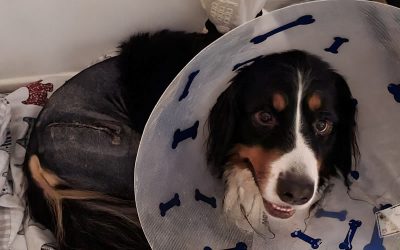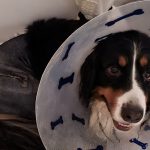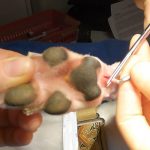Jackal visited Bicester Vets for a Vasectomy. It is advised that male ferrets (called Hobs) are vasectomised rather than castrated (i.e. the testicles are left in place but the ferret is no longer capable of fertilising the female).
This is done so they can still mate with the female ferrets (called Jills); which is very important for the health of the female, as without regular mating, serious health issues can arise.
Other Interesting Ferret Facts
Latin name: Mustela Putorius Furp
Young: Kittens
Vasectomised males: Hobbles or Vassies
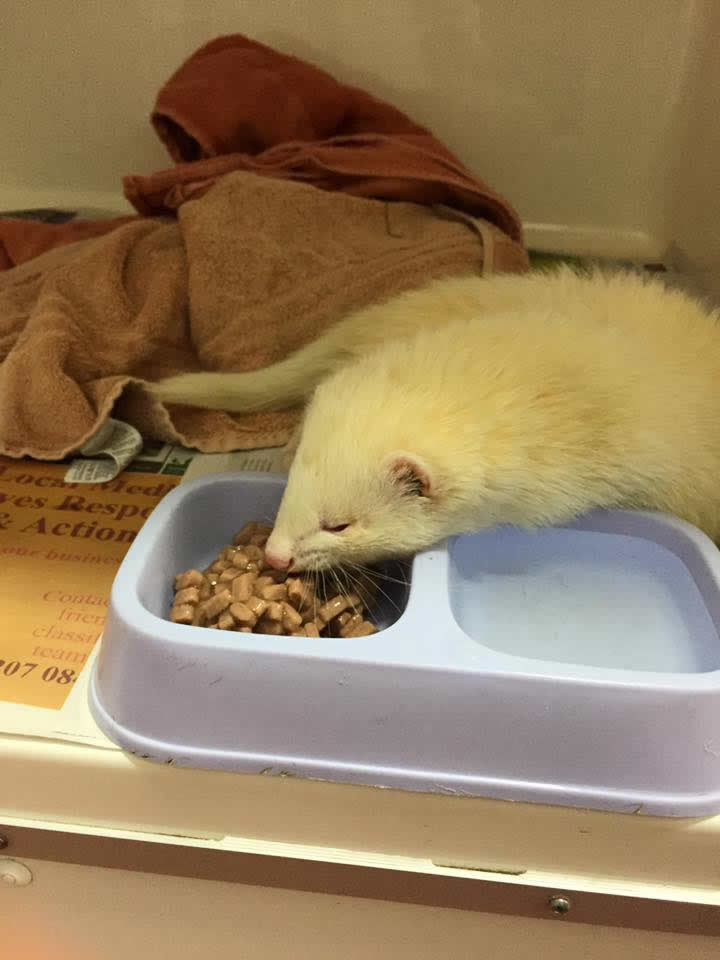
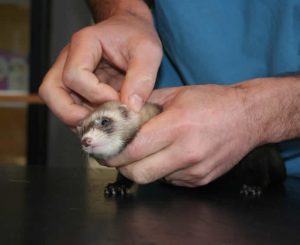 Life span: 5 – 11 years (domesticated)
Life span: 5 – 11 years (domesticated)
Litter size: 5 – 13 kits
Birth weight: 8 – 10 grams
Eyes open: From four weeks
Gestation period: 38 – 44 days
Average weight: male 700-2000 gms, female 600-900 gms.
Sexual maturity: male 5-9 months, female – spring after birth
Weaning age: 6 – 8 weeks
Diet: Carnivorous
Vaccinations: Canine Distemper
Ferret Husbandry
*Ferrets are carnivorous animals so need an appropriate diet containing meat. Good-quality ferret food available from pet shops is appropriate, although they can also be fed good-quality cat food.
*Ferrets left with free run of the house will cause a lot of damage, and can get themselves into trouble with their ability to fit into very small spaces. Therefore they should be kept in a large cage.
*The cage should contain a water bottle, ceramic food bowl, and a litter tray. They also enjoy having toys to play with e.g. small balls (that he/she can’t chew or swallow), feeding balls and tunnels.
*The litter tray should contain wood shavings or normal odour-free cat litter and be emptied daily. Ferrets may need to be trained to use the tray – you can start by placing some droppings in the tray and placing him/her in it if they start circling/pacing.
*Dust-extracted bedding material should be provided in the cage
*Ferrets enjoy sleeping above ground level so an ideal accessory to keep them happy is a hammock. A simple square of material hung from the top of the cage will serve this purpose.
*Ferrets are extremely active and very playful. Always find time to socialise with your ferret on a daily basis, this will add variety and stimulation to your pet’s day.
*Ferrets can be bathed twice a month with a mild shampoo
*Clipping your ferret’s nails can be tricky as they often wriggle lots. They can be distracted with a treat such as a mineral lick.
*If you have small mammals such as rabbits or hamsters, you must exercise extreme caution with regards to ferrets.They are natural enemies, and your ferret may kill them. In general, ferrets usually get along with cats and dogs.
*It is not recommended to leave hunting breeds like terriers and hounds alone with ferrets as their instincts may take over and your ferret could be hurt.
Handling ferrets correctly
*Handle young ferrets as much as possible to prevent biting. Ferrets should be purchased from a reputable breeder who has handled him/her as a youngster.
*Allow your ferret to come to you before picking him/her up. This prevents frightening them and reduces the risk of being bitten
*Ferrets should be grasped around the shoulders, with your thumb under their mouth and supporting the hind legs with your other hand, then gently bring the ferret against your chest.
* Ferrets have a natural instinct to bite. If your ferret is prone to nipping, train them properly by scruffing them every time they nip and saying NO.
*They can be trained to sit quietly in a pouch or pocket with patience and perseverence.
*You are able to bath your ferret at least twice a month with a mild shampoo.
*To clip your ferrets’ nails, allow him to lick a vitamin treat whilst clipping them to distract him otherwise they move too much.
Preventative health care
*Ferrets should be vaccinated against Canine Distemper from 12 weeks of age. It is a single vaccination that needs to be done yearly. If ferrets are not vaccinated they can pick up this often fatal disease. Clinical signs include discharge around the eyes, nose and chin, loss of appetite, rashes and lethargy.
*The ferret breeding season in the UK runs from Spring to Autumn.
If jills (females) are left unmated, they remain in oestrus for a prolonged period, resulting in bone marrow suppression and anaemia. This can be fatal. It is therefore recommended that females are allowed to mate with a male when in oestrus. The male should be vasectomised first so he cannot get the female pregnant.
Common Illnesses
Ferrets can be affected by a number of common conditions. These include respiratory infections, diarrhoea, vomiting, ear mites, urinary tract stones, heart disease and adrenal gland tumours.
If you are at all concerned that your ferret is unwell then please phone the practice to make an appointment.
Building Plans for 2024
We have also commenced a major construction project externally which will add significantly to the facilities we can offer to our patients
Welcome to our NEW Reception & Waiting Room
Our aim was to make a beautiful space which we can all be proud of, but essentially, we needed to retain practicality and ergonomic design
Hip Hip Hooray for Ava
Ava is now seven months on from her surgery. She is very lively and is behaving like a puppy again!



